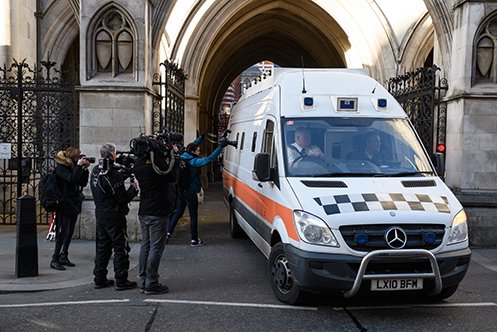The High Court’s decision on the Worboys case
by HH Jeremy Roberts QC
30 Mar 2018
The High Court has now given its decision in Mr Worboys' case. It has decided that the direction made by a panel of the Parole Board for Mr Worboys' release on licence should be quashed, and the case reheard by another panel. The basis of the decision was that the panel should have directed the production of information relating to other sexual offences (in addition to those of which Mr Worboys had been convicted) which he was alleged to have committed against female passengers in his taxi.

Members of the media look on as a prison van carries convicted rapist John Worboys from the High Court on February 7, 2018 in London, England. A judicial review hearing on March 13 allowed victims to challenge his planned release. (Photo by Leon Neal/Getty Images)
What caused the problems which have arisen in the Worboys case?
Many of the problems which have arisen in Mr Worboys' case have resulted from the fact that he was prosecuted for offences against only fourteen of the much larger number of women from whom the police had received complaints that he had committed sexual offences against them. The jury acquitted him on the charges relating to two of the fourteen. In the result his sentence necessarily reflected only a small part of his alleged offending.
It also meant that the Parole Board did not have the solid basis for assessing his risk which it would have had if the other allegations had been tried in court. As a “court” for the purposes of the European Convention on Human Rights, the Board has to have in place a set of judicial procedures to ensure fairness. That means that it is required to act on evidence and not on suspicion. It is entitled to receive and consider hearsay evidence, including hearsay evidence suggesting that an offender committed offences other than those of which he was convicted: but assessing the weight to be attached to allegations which have not resulted in convictions and which are denied by the offender is necessarily a problematic and difficult exercise. By contrast, where the offender has been convicted of an offence by a criminal court after a trial, the conviction is regarded as conclusive evidence that he committed that offence, and the Board cannot go behind the conviction.
Why was Worboys only tried for a small proportion of the allegations against him?
The reason why only a relatively small proportion of the allegations against Mr Worboys were tried in a criminal court is that there is a general principle that indictments should not be “overloaded” so as to expect a jury to wrestle with a large number of offences in the same trial. A jury trial is essentially an oral exercise in which the jury is expected to sit and listen to all the witnesses giving evidence, and then be able to disentangle the various charges so as to make a separate decision on each of them.
The “two stage trial”
The problem of an indictment which reflects only a relatively small part of the defendant's alleged offending has been around for many years, especially in cases involving multiple offences of fraud. It was primarily to cater for offences of that kind that Parliament, in the Domestic Violence, Crime and Victims Act 2004, introduced a new procedure under which the prosecution could apply for a “two stage trial”. In such a trial the indictment would contain a large number of counts but some of those would be treated as samples to be tried by the jury: if the jury convicted on any or all of the sample counts, any others which appeared to relate to the same course of criminal conduct would be tried by the judge alone. The judge would of course be required to give a detailed judgement setting out the reasons for his or her decision.
The relevant part of the 2004 Act came into force in January 2007, which I believe was before Mr Worboys was arrested and charged. With all the benefit of hindsight it can be seen that, if the “two stage trial” procedure had been used in his case, the judge would have been able to pass a sentence which reflected the totality of his sexual offending, and the assessment of his risk by the Parole Board (and indeed the professional witnesses in the parole proceedings) would have had an appropriate starting point.
Of course a two-stage trial would have been more expensive to the public purse than the restricted single trial which took place, but it might be thought that the additional expense would have been well worth while. It would have been much more satisfactory for all those who could be proved to have been victims of Mr Worboys, who would have had the opportunity of giving their evidence in court - instead of, as happened to many of them, being thanked for their co-operation but told that no action was going to be taken on their complaints. And it would have been much more satisfactory in terms of ensuring that the sentence imposed by the trial judge was appropriate to the totality of Mr Worboys' offending, and that the Parole Board was in a position to make a fully informed assessment of his risk to the public.
It is to be hoped that future cases like Mr Worboys' will be rare. However, when they do occur, it would surely be helpful if the CPS make use of the availability of the two-stage trial procedure.
Greater transparency
In the High Court proceedings in Mr Worboys' case a further point was raised, this time against the Secretary of State for Justice. It was contended, and the court agreed, that Rule 25 of the Parole Board Rules (which were made by the then Secretary of State in 2016 and approved by Parliament) is ultra vires and unlawful. Rule 25 provides that no information about parole proceedings should be made public, and that a contravention of that prohibition is actionable as a breach of statutory duty by anyone who suffers loss or damage as a result.
The court accepted that it is lawful and proper for parole proceedings to be conducted in private where necessary (as it usually is) in the interests of confidentiality. It held, however, that the “blanket ban” under Rule 25 goes too far. The Secretary of State has now stated that he accepts that ruling and that Rule 25 will be abolished after the Easter recess, so that the Parole Board should be able at least to make summaries of its decisions available to victims. This news is welcome to many of us at the Parole Board. Indeed there is much to be said for making the summaries available to the media and the public as well as the victims.
Challenging Parole Board decisions
A further proposal which is under consideration by ministers is whether a new system for challenging (or inviting reconsideration of) decisions of Parole Board panels should be introduced. In principle that seems like a good idea, but it would be regrettable if any new system led to offenders who actually pose no significant risk to the public being detained in prison for a substantial period of time while lengthy appeal proceedings are in progress.
His Honour Jeremy Roberts QC was formerly a judge at the Central Criminal Court. He is a member of the Parole Board and a Master of the Bench at the Honourable Society of the Inner Temple. He was a speaker at the British Academy conference, ‘Challenges to Judicial Independence in Times of Crisis’.
The views expressed by our authors on the British Academy blog are not necessarily endorsed by Academy but are commended as contributing to public debate.


